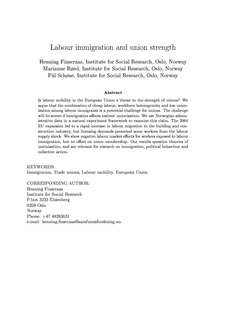| dc.contributor.author | Finseraas, Henning | |
| dc.contributor.author | Røed, Marianne | |
| dc.contributor.author | Schøne, Pål | |
| dc.date.accessioned | 2020-01-13T08:23:49Z | |
| dc.date.available | 2020-01-13T08:23:49Z | |
| dc.date.created | 2019-10-31T11:11:34Z | |
| dc.date.issued | 2019 | |
| dc.identifier.citation | European Union Politics (EUP). 2019, . | |
| dc.identifier.issn | 1465-1165 | |
| dc.identifier.uri | http://hdl.handle.net/11250/2635829 | |
| dc.description.abstract | Is labour mobility in the European Union a threat to the strength of unions? We argue that the combination of cheap labour, workforce heterogeneity and low unionisation among labour immigrants is a potential challenge for unions. The challenge will be severe if immigration affects natives’ unionisation. We use Norwegian administrative data in a natural experiment framework to examine this claim. The 2004 European Union expansion led to a rapid increase in labour migration to the building and construction industry, but licensing demands protected some workers from the labour supply shock.We show negative labour market effects for workers exposed to labour immigration, but no effect on union membership. Our results question theories of unionisation and are relevant for research on immigration, political behaviour and collective action. | |
| dc.language.iso | eng | |
| dc.title | Labour immigration and union strength | |
| dc.type | Peer reviewed | |
| dc.type | Journal article | |
| dc.description.version | acceptedVersion | |
| dc.source.pagenumber | 21 | |
| dc.source.journal | European Union Politics (EUP) | |
| dc.identifier.doi | 10.1177/1465116519881194 | |
| dc.identifier.cristin | 1742753 | |
| dc.relation.project | Norges forskningsråd: 270687 | |
| dc.relation.project | Norges forskningsråd: 236786 | |
| cristin.unitcode | 7437,0,0,0 | |
| cristin.unitname | Institutt for samfunnsforskning | |
| cristin.ispublished | true | |
| cristin.fulltext | postprint | |
| cristin.qualitycode | 2 | |
